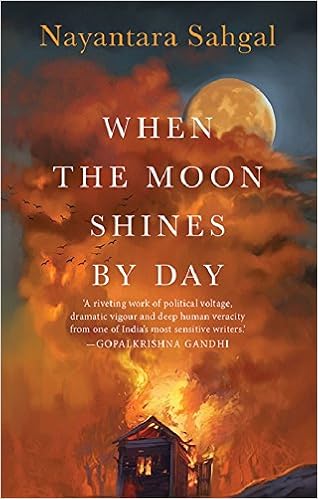Requiem for a Dream: When the Moon Shines by Day (Nayantara Sehgal)

On 14 February 2019 as the world around me celebrated the most commercialized day of love, news came back from home about the death of 44 CRPF soldiers in Pulwama, Kashmir as a RDX-laden vehicle rammed into the soldiers convoy. What came in the next few days was something that followed the morbid pattern of hyper-nationalism laced with the heady mixture of jingoism as hate-splattered Facebook posts and Whatsapp messages circulated in the daily conversations of that uncle who brought chocolates for you and was now a firm believer in death to all Pakistanis, that childhood friend whose every message is a call for a war which he would watch on his Facebook live, an old teacher who now believes that it is time that India gave another "surgical" answer to its neighbour as well as anyone who is not a true Indian (read: upper caste Hindu). Reasons vanished, questions muted out, televisions chanted war cries and soon, 4 days later, Kashmiri students all across north India huddled in rooms as mobs gathered to avenge from them deaths that were suddenly theirs to repent and answer for. This is a pattern we have all seen and read before, for most of us we even know how the story will end, that is until the next big jingoistic slogan catches on. It is in the midst of this, that I started reading Nayantara Sehgal's When the Moon Shines by Day, written two years back, reflecting on a past and a future which is forever caught up in violent images of each other.
Sehgal, as most of us know is the niece of the most reviled man in the right-wing camp, the fountainhead of all things liberal and therefore problematic as seen by the Nagpur headquarters and its different tentacles. Carrying a legacy as such, Sehgal is every bit the "anti-national" that her uncle was, asking questions, critiquing agendas and most importantly writing books of dystopia which carry the audacity to hope. When the Moon Shines by Day is a slim book with large fonts-- Sehgal is aware that the age of the reader is long gone. It is about a group of individuals, belonging to an of course moneyed class, surrounded by their parties and their debates, who carry within them the dream of a yesterday, a dream of freedom and life with dignity. Rehana and her book club read books and discuss the world around them--a world where a writer is arrested for questioning the concept of pure race under the "law against dangerous thought. And he's in solitary confinement so that he doesn't infect others" (69); a world where Rehana's young Muslim servant repeatedly reminds everyone who comes to the house to call him Morari Lal as he knows the penalty that his name carries; a world where books are being taken as "chandda" (deposits) for the weekly book burning sessions in each neighbourhood. Sehgal's protagonists are rich, safe and therefore have the luxury to reflect and criticise--Sehgal is aware of that and urges all those who have that luxury to not sit idle while the world around falls into chaos. In the 150-odd pages she packs in everything that a nightmare can contain-- pure race scientists, writers following revolutions and coming to the hypothesis that all revolutions ultimately lead to the same monstrosities, a Culture Day parade to announce the greatness of one religion and the poisonous nature of the others, et al. But countering these, are moments of audacious hope, of unique forms of rebellion, of diaries from prison and of comradeship of all those who dare to dream of an equal space-- a nation of us, of all.
As the Moon Shines by Day is much like those nightmares where you are falling off a cliff and don't know how to save yourself --yet your body jerks you at the last moment into waking you up. It is a book that tells you that things are going to get much worse, yet you can still make a change, still refuse to buy into the hate, shout till your voice runs dry and your fingers stiffen from the numerous times you ask and write to people to question, to demand answers.
"Who lives if India dies? Who dies if India lives?"--politics becomes poetry in the darkest of times. Sehgal's book reminds you of the power of words (both constructive and destructive), of persuasion and of taking a moment in the madness to realise the irreparable damage that we are all capable of just because we were too smug to say a word, write a line, sing a rebellion when hate came visiting.

Comments
Post a Comment